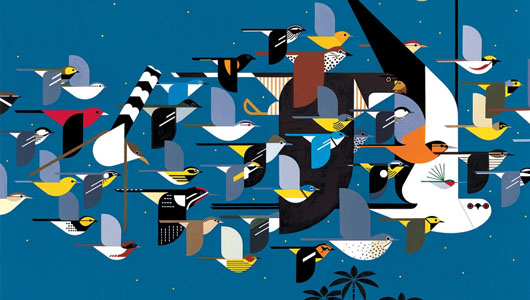插畫家 (Illustrator):Charley Harper
年份 (Year):1922 – 2007
國籍 (Country):美 (US)
Charley Harper(1922年8月4日 - 2007年6月10日)是一位出身於辛辛那提的美國現代派畫家。以個人風格強烈的野生動物版畫、海報和書籍插圖出名。他出生於1922年西弗吉尼亞州Frenchton,農莊的成長背景經歷影響了Harper的工作,後來離鄉背景到辛辛那提藝術學院就讀藝術相關科系,並獲得該學院的遊學獎學金。Harper後來遇到了同鄉出身的藝術家Edie Mckee,1947年兩人於畢業不久後邁入婚姻生活。
Charley Harper陸陸續續在職涯中出版了許多書籍,包括"Golden Book of Biology(金典生物學)",福特時代雜誌,還有版畫海報等作品。主題圍繞大自然生態(以鳥類插圖表現特別出色),Charley亦為許多自然國家公園或相關組織創造大量作品,包括:國家公園服務區、辛辛那提動物園、辛辛那提自然中心、哈密爾頓縣(俄亥俄州)公園區、賓夕法尼亞州的鷹山保護區。還有大沼澤地國家公園的教育看板。
在他本人稱之為“微現實主義”的風格中,Charley以極簡的視覺元素完成作品。當人們請他描述視覺風格時,Charley如此回答:
當我看到野生動物和自然時,並不會留意觀察鳥類翅膀的羽毛細節,我看到的是繁雜的形狀與花俏顏色、圖案、紋理之間相互交錯的迷人組合,與其創造出有趣圖案的無限可能性。插圖中所有元素因素息息相關,在相互影響的過程中達成完美的平衡,藝術家以邏輯將複雜混亂的圖樣整理起來,重新組織成屬於自己的宇宙秩序。
他的創作受到約翰·詹姆斯·奧杜邦的現實主義、立體主義、極簡主義,愛因斯坦的物理學和現代藝術和科學之影響。風格簡化了複雜的生物和自然學科,Charley指出:我不覺得這樣簡化元素會造成創作阻力。每個人都應該明白:有些人喜歡它有些人則否。有ㄧ些人會計算鳥翅膀羽毛的數量,也有人像我ㄧ樣不在乎這點。
以這樣的方式所創造出來的藝術風格狂野大膽,色彩艷麗,異想天開。設計師托德·奧爾德姆寫道:“Charley的創造靈感與精準的色彩感是不容置疑的,人們往往對於他苛刻的要求細節精確度結合這點感到驚嘆。”Charley除了以版畫藝術為媒介之外,還替數篇散文詩歌繪製插圖。
Charley Harper
Charley Harper (August 4, 1922 – June 10, 2007) was a Cincinnati-based American Modernist artist. He was best known for his highly stylized wildlife prints, posters and book illustrations. Born in Frenchton, West Virginia in 1922, Harper's upbringing on his family farm influenced his work to his last days. He left his farm home to study art at the Art Academy of Cincinnati, and won the academy’s first Stephen H. Wilder Traveling Scholarship. Also during his time at the Academy, and supposedly on the first day, Charley met fellow artist Edie Mckee, whom he would marry shortly after graduation in 1947.
During his career, Charley Harper illustrated numerous books, notably The Golden Book of Biology, magazines such as Ford Times, as well as many prints, posters, and other works. As his subjects are mainly natural, with birds prominently featured, Charley often created works for many nature-based organizations, among them the National Park Service; Cincinnati Zoo; Cincinnati Nature Center; Hamilton County (Ohio) Park District; and Hawk Mountain Sanctuary in Pennsylvania. He also designed interpretive displays for Everglades National Park.
In a style he called "minimal realism", Charley Harper captured the essence of his subjects with the fewest possible visual elements. When asked to describe his unique visual style, Charley responded:
When I look at a wildlife or nature subject, I don’t see the feathers in the wings, I just count the wings. I see exciting shapes, color combinations, patterns, textures, fascinating behavior and endless possibilities for making interesting pictures. I regard the picture as an ecosystem in which all the elements are interrelated, interdependent, perfectly balanced, without trimming or unutilized parts; and herein lies the lure of painting; in a world of chaos, the picture is one small rectangle in which the artist can create an ordered universe.
He contrasted his nature-oriented artwork with the realism of John James Audubon, drawing influence from Cubism, Minimalism, Einsteinian physics and countless other developments in Modern art and science. His style distilled and simplified complex organisms and natural subjects, yet they are often arranged in a complex fashion. On the subject of his simplified forms, Harper noted:
I don't think there was much resistance to the way I simplified things. I think everybody understood that. Some people liked it and others didn't care for it. There's some who want to count all the feathers in the wings and then others who never think about counting the feathers, like me.
The results are bold, colorful, and often whimsical. The designer Todd Oldham wrote of Harper, "Charley’s inspired yet accurate color sense is undeniable, and when combined with the precision he exacts on rendering only the most important details, one is always left with a sense of awe." Charley, on numerous examples, also went outside the medium of graphic art and included short prose poems for the artwork he made.
原圖資料來自於Wikipedia






























